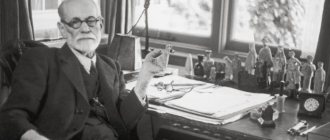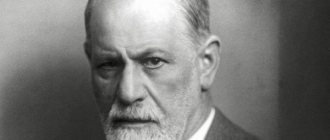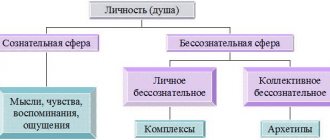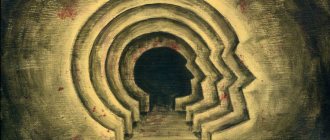Freudianism and neo-Freudianism
Definition 1
Freudianism and neo-Freudianism are directions of psychoanalytic philosophy that emerged in the 20s of the twentieth century in Europe and America. The empirical basis of Freudianism and neo-Freudianism is psychoanalysis.
Definition 2
Psychoanalysis is a method of treating mental illnesses based on identifying and analyzing repressed experiences
Freudianism got its name from the founder of this movement, S. Freud. We have already completed an essay
essay on philosophy in more detail. One of Freud's main achievements is the first detailed theory of personality structure he created, based on ancient scientific and philosophical problems - the presence of several opposing principles in the human consciousness.
Finished works on a similar topic
- Course work The concept of the unconscious by S. Freud and neo-Freudians 410 rub.
- Abstract The concept of the unconscious by S. Freud and neo-Freudians 220 rub.
- Test work The concept of the unconscious by S. Freud and neo-Freudians 240 rub.
Receive completed work or specialist advice on your educational project Find out the cost
The main regulator of human behavior is consciousness. Freud discovered the presence of another layer in the personality structure, which is characterized by powerful desires and aspirations hidden behind the veil of consciousness - the unconscious. In other words, they identified three levels of the human psyche:
- unconscious;
- preconscious;
- conscious.
In his practice, Freud often encountered unconscious experiences and motives that significantly burden a person’s life and can act as the cause of his neuropsychic illnesses.
an essay on this topic
Sigmund Freud developed in more detail a special concept of the human psyche, the components, or instances, which include:
- It;
- I;
- Super-ego.
It is an unconscious layer of the psyche, representing instincts. It is this that acts as a person’s motivation, being an innate state of excitement that requires release. The basic instincts include Eros - the instinct of life and Thanatos - the instinct of death.
Looking for ideas for study work on this subject? Ask a question to the teacher and get an answer in 15 minutes! Ask a Question
I am the area of consciousness within which the perception of the external world and adaptation to it occurs.
The super-ego represents the highest authority of mental structures, responsible for the individual’s perception of moral standards, fulfilling the role of conscience.
The transformation of human hidden thoughts into the manifest content of dreams is an example of the transition of one way of expressing psychic material into another. To understand the nature of dreams it is necessary to understand the meaning of the dream itself. Freud put forward the position that the conscious dream is a distorted replacement of the unconscious.
Unlike S. Freud and C. Jung, neo-Freudians did not strive to explore the nature of individual human actions, but to provide an explanation of the social structure of people's lives. The main representatives of neo-Freudianism are A. Adler, K. Horney, E. Fromm.
REPRESENTATIVES OF FREUDISM
Perhaps the most prominent representatives of Freudianism include A. Adler, K.G. Jung and O. Rank, who were Z. Freud's closest students. Among the above-mentioned “pupils” of Freud in the 1910s. a dispute arose about what should be considered the main driving factor of the psyche. If Freud recognizes this as the energy of unconscious psychosexual drives, then for A. Adler this role is played by an inferiority complex and the desire for self-affirmation. A. Adler expounds this idea in “Individual Psychology,” which he created on the basis of Freud’s teachings. He believed that initially most children have a feeling of their own inferiority compared to “omnipotent adults,” which leads to the formation of an “inferiority complex” in the child. Personal development, according to Adler’s views, depends on how this complex will be compensated. In pathological cases, a person may try to compensate for his inferiority complex by striving for power over others.
C. G. Jung did not share the views of the great teacher all his life. However, many of Freud's concepts had a significant influence on the development of C. G. Jung as a scientist. The main work of S. Freud, in which C. G. Jung became interested and applied his postulates in his practice, was “The Interpretation of Dreams.”
Their differences in views began in 1913. The basis of these disagreements were opposing approaches to understanding the problem of the “unconscious”. From Jung's point of view, the unconscious is akin not only and not so much to human instincts, as Freud understood, but is a high manifestation of the human psyche. If for Freud the unconscious is of a biological nature, then for Jung it is also endowed with social elements.
Studying the problems of culture and society, C. G. Jung comes to the conclusion that, along with the “individual unconscious,” there is also a “collective unconscious.” In the school of “analytical psychology” by C. G. Jung, the collective unconscious and its archetypes are considered the fundamental principle. Jung believed that there is a certain inherited structure of the psyche, developed over hundreds of thousands of years, that makes us experience and realize our life experiences in a very specific way. And this certainty is expressed in what Jung called archetypes that influence our thoughts, feelings, and actions.
5 pages, 2467 words
Freud as the founder of psychoanalysis. About Freud
... psychoanalysis as a method of treating mental illness. He formulated a theory of the structure of human personality, developed psychological theories concerning excitability, defense mechanisms, and depression. Freud attached great importance to understanding the inner world of a person... the psychoanalytic situation creates conditions under which the patient’s thoughts and images can emerge from very deep layers...
Otto Rank believed that all human activity was subordinate to overcoming the primary “birth trauma.” This “birth trauma” becomes the first source of fear and anxiety. O. Rank proceeded from the fact that the moment a child is born and separated from its mother is a traumatic event in a person’s life. The desire to return to the mother's womb, to restore the previous position, is directly related to the trauma of birth.
3. NEO-FREUDISM. GENERAL CHARACTERISTICS
Neo-Freudianism is a direction in psychology that developed in the 20-30s of the 20th century, founded by the followers of Sigmund Freud, who accepted the foundations of his theory, but in which the key concepts of Freud's psychoanalysis were reworked, for example, based on the postulate of the social determinism of the human psyche.
Freud's psychoanalysis (Freudianism) consisted of a systematic explanation of unconscious connections through the associative process. Freud proposed a new structure of human personality, dividing it into Ego (“I”), Superego (“SuperI”) and Id (“It”). Freud subjects all mental states, all human actions, and then all historical events and social phenomena psychoanalysis, that is, interprets it as a manifestation of unconscious, and above all sexual, drives.
Followers of Freud (representatives of neo-Freudianism) believe that socio-cultural influences play a leading role in the human condition. That is, they focus their attention on social and cultural processes. In their opinion, it is these processes that have a significant impact on the emergence of an individual’s intrapersonal conflicts. All theoretical constructions of this direction are based on the concepts of the unconscious and the fundamental conflict of relations between the individual and society.
Various theories and concepts of neo-Freudians contributed to the spread of psychoanalytic orientations and the introduction of a complex of psychoanalytic ideas into various spheres of public life. Having criticized a number of provisions of classical psychoanalysis in the interpretation of intrapsychic processes, representatives of neo-Freudianism abandoned its most important concepts (irrational motives of human activity, initially inherent in each individual) and shifted the center of gravity to the study of interpersonal relationships.
This is done in an effort to answer questions about human existence, how a person should live and what he should do. They consider the cause of neuroses in humans to be anxiety that arises in a child when confronted with a world that is initially hostile to him and that intensifies with a lack of love and attention. Later, this reason becomes the inability for an individual to achieve harmony with the social structure of modern society, which creates in a person a feeling of loneliness, isolation from others, and alienation. It is society that is viewed as the source of universal alienation and is recognized as hostile to the fundamental trends in the development of the individual and the transformation of its life values and ideals. Through the healing of the individual, the healing of the entire society can and should occur.
16 pages, 7720 words
Chapter 2. Sigmund Freud and psychoanalysis
... inferiority, or the feeling of inadequacy, is, after all, the main task of personality development. INTRODUCTION TO PSYCHOANALYSIS THIRTY-THIRD LECTURE FEMININITY Dear ladies and gentlemen! All this time, ... the basis for her growth and development as a mature person, and not as a lower being. Ernst Jones, Freud's biographer, was one of the first psychoanalysts to prove that...
Neo-Freudianism did not adopt those concepts that, having originally been formulated by the founder of psychoanalysis, over time revealed their clearly unscientific and illusory character. Moreover, many theoretical positions of classical psychoanalysis were not only questioned, but also subjected to fundamental criticism by individual representatives of neo-Freudianism. However, their critical considerations regarding Freud's psychoanalysis concerned only particulars that related to the procedure of psychoanalytic research, erroneous theoretical conclusions, and the interpretation of the nature of various mental processes that determine the activity of the individual. The general principles and guidelines of classical psychoanalysis (“psychology of the unconscious”, ideas about the irrational moments of human activity, conflict and splitting of the inner world of the individual, the “repressiveness” of culture and society) formed the basis of the teachings of modern neo-Freudians.
Thus, neo-Freudians, like Freudians, explain human behavior by the activity of the unconscious. In addition, they also explain mental illness through the dynamics of unconscious processes. Like Freud, neo-Freudians retain the concepts of repression and resistance and use the same psychoanalytic techniques invented by Freud: dream interpretation, free association, transference, etc.
The similarities between Freudianism and neo-Freudianism (and the newest psychoanalysts of the “I”) are in their common understanding of the unconscious as the engine of human behavior, in emphasizing the role of repression and the use of psychoanalytic techniques. They are also united by an analysis of culture and society based on the unconscious. Thus, we see that bourgeois ideology is endlessly inventive, offering the same ideological food under different sauces. Neo-Freudianism is a seasoning for Freud's main dish - the unconscious - taking into account the role of social and cultural factors in the determination of normal and pathological phenomena of the human psyche.
4. REPRESENTATIVES OF NEO-FREUDISM
The main representatives of neo-Freudianism are G. Sulivan, K. Horney, E. Fromm. Neo-Freudians often also include A. Kardiner, F. Alexander and some other representatives of psychoanalysis. A person’s personality, according to Sullivan, is not an innate quality, but is formed in the process of communication between an infant and others, that is, “personality is a pattern of repeated “interpersonal relationships” . In its development, a child goes through several stages - from infancy to adolescence, and at each stage a certain model is formed. In childhood, this model is formed on the basis of joint games with peers, in pre-adolescence - on the basis of communication with representatives of the other sex, etc. Although a child is not born with certain social feelings, they are formed in him in the first days of life, their development is associated with the desire person to relieve the tension created by his needs.
Sullivan believed that need both creates tension and forms ways to overcome it - dynamisms, which are not only models of energy transformations, but also a unique way of accumulating experience and knowledge necessary to meet needs and adapt. At the same time, there are dynamisms that are more and less important for life, which satisfy needs of different degrees of importance. Sullivan considered the main, leading needs for all people to be the need for tenderness and the need to avoid anxiety. However, the possibilities of satisfying them are different, since in order to realize the need for affection, there are certain dynamisms that help the child receive it from loved ones. The sources of anxiety are so diverse and unpredictable that the possibility of unpleasant, anxiety-provoking events in a person’s life cannot be completely excluded. Thus, this need to avoid anxiety becomes leading for the individual and determines the formation of the “I-system” that underlies it.
8 pages, 3579 words
Conscious and unconscious in the moral behavior of an individual. ...
... a special form of energy direction in human life processes. Freud tried to explain the dynamic nature of character traits by ... the energy manifested in a person's emotional drives. From this comes the definition of psychoanalysis as “the study of interpersonal relationships.” ... sincere service to some idea, which in the eyes of society is the fundamental motive for courageous behavior. Despite...
Fromm's psychoanalysis is anthropological and humanistic in nature. Man is the starting point from which the philosopher begins all his research. But Fromm, unlike Freud, considers man not one-sidedly, but in the totality of biological and social principles. All ideas about the need to transform society begin with the scientist’s ideas about the need to form a new personality. The formation of a person of the future is based on love, altruism and goodness as an internal need of the soul.
These principles, from the point of view of E. Fromm, are fundamental in the teachings of the so-called “radical humanism”, the founder of which he considered K. Marx. It was Fromm’s study of American industrial society that helped the scientist conclude that changes in the psyche of modern people are not determined only by biological factors, they are a reflection of social processes. But under the influence of the teachings of S. Freud, E. Fromm, nevertheless, relies on the principles of psychoanalysis in explaining the formation of personality.
Thus, Fromm argues that there are two principles in the human psyche: love of life and love of death (Eros and Thanatos in Freud).
Some people are inclined to the first principle, others to the second. This gives rise to two main psychological types: biophiles - those who want to live, and necrophiles - those who want to die. E. Fromm explains the behavior of many politicians who played a negative role in society, including Hitler, by the fact that they belong to the type of necrophiliacs, those who are attracted to everything dark, negative, and evil.
Since Fromm’s entire socio-philosophical concept is permeated with love for man, the scientist does not ignore the problem of love itself. According to Fromm, love is not given to everyone; it is a gift of fate that opens a person’s path to self-expression and freedom. Fromm’s concept of responsibility is closely related to the concept of love, which he defines as a person’s readiness to act.
But the idea of a future society proposed by E. Fromm is not aimed at creating a new social system, but at the formation of small communities with their own culture, language and morality within the framework of the previous formation. Fromm sought to shift the emphasis from the biological motives of human behavior in psychoanalysis to social factors, to show that “human nature - human passions and anxieties - is a product of culture1 Flight from freedom. Per. from English A. Laktionova. - M.: AST; AST Moscow, 2009. - P. 17.”
6 pages, 2914 words
Sigmund Freud psychoanalysis
... it is regarded as the first chapter in the hysteria of psychoanalysis created by Freud. There is every reason for this, since in this area... it has become especially dangerous. As a result, foreign psychoanalytic societies literally bought Freud from the Nazis and transported him to England, where... Committing an action, the true cause of which a person does not suspect, gave Freud the idea that the work of the brain is not...
The concept of “overcompensation” by A. Adler
Adler believed that in order to understand the motives of human activity, it is necessary to know the ultimate goal of his aspirations, the so-called unconscious life plan. A person finds fulfillment in searching for the meaning of life and striving for self-realization. To overcome feelings of inferiority and self-affirmation, a person begins to actualize his creative potential, which is commonly called overcompensation.
Definition 3
Overcompensation is a special type of reaction to feelings of inferiority. Based on it, people are capable of achieving significant success in life and are distinguished from others by a series of exceptional abilities.
K. Horney's theory
The biological orientation, that is, a characteristic feature of classical psychoanalysis, was replaced by a sociocultural one, characteristic of neo-Freudianism.
An innovation in Horney's theory was the concept of “self-image,” which consisted of knowledge about oneself and attitude towards oneself. An adequate image helped me overcome psychological anxiety.
Horney considered the social relationship between a child and his parents to be based on two principles: the desire to satisfy one’s desires and the desire for security. The leading role belongs to the latest trend - the process of satisfying the need for security, which forms a healthy personality, and on the contrary - the behavior of parents that prevents this causes the development of basal anxiety in the child, that is, a feeling of loneliness and helplessness in front of the dangers of the surrounding world.
Basic anxiety in childhood can cause the formation of neuroses in adulthood. To overcome basal anxiety, the child begins to resort to defensive strategies called neurotic tendencies or neurotic needs. Each trend has three orientations:
- on people;
- from people;
- against people.
In accordance with them, three types of neurotic personality were identified:
- compliant;
- isolated;
- aggressive.
A. Adler's individual theory of personality
The prevailing opinion that Alfred Adler was one of Freud's first students was not true. Even before becoming acquainted with the ideas of psychoanalysis, Adler conducted his scientific research in this direction. He joined the community of psychoanalysts, having already formed a professional worldview. My acquaintance with S. Freud began with a letter in which the master of psychoanalysis expressed his gratitude to the young man who spoke in defense of his new book “The Interpretation of Dreams.”
However, while accepting the basic concepts of the theory of the unconscious, A. Adler was never an orthodox supporter of the thesis about the universality of libido. On the contrary, Adler's neo-Freudianism consisted in promoting the energy of creativity to the role of the driving force in the development of personality. When he published the book “A Study of Defective Organs,” where he outlined his understanding of the development of mental processes, Freud’s attitude towards the young man deteriorated sharply. The founder of psychoanalysis was jealous, sometimes even painful, about deviations from his theory, not accepting dissent. He preferred to part with such people, considering them “paranoid” and their ideas “incomprehensible.”
Adler went his own way. His neo-Freudianism is a view of personality disorders from the point of view of a person's unconscious desire for superiority over others.
The individual personality theory focused on the fact that a person creates himself, but his freedom is limited by false goals imposed by society since childhood. The problem of the impossibility of realizing the individual in full lies in the feeling of inferiority that she experiences in comparison with more successful people and the ideals of society. As a result, a person, in order to overcome this feeling, strives to realize fictitious goals that he has set for himself in order to achieve superiority over others. The authorities respond best to this personal request. Therefore, a person subconsciously strives for power and perfection in order to compensate for once unfulfilled desires in honor and respect.
Many of the ideas he expressed in theory were autobiographical in nature. For example, the desire of an individual to be accepted into a society of his own kind, the opportunity to realize his potential, thereby being useful to others, was embedded in the idea of social interest, which emphasized the importance of common values and empathy for each other. As a child, Adler was a weak child, and he felt great gratitude to the children who took him into joint games. In communicating with friends, he received that share of attention and respect that he was deprived of in his family.







